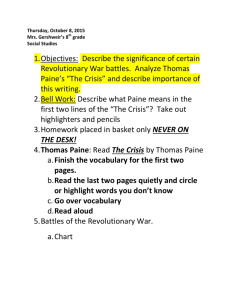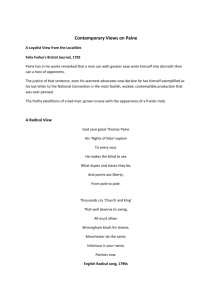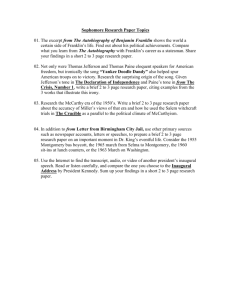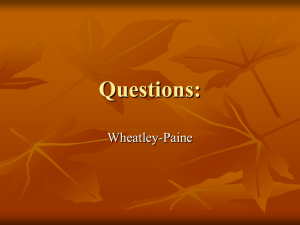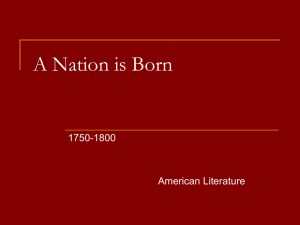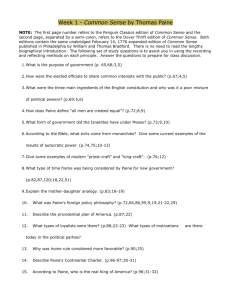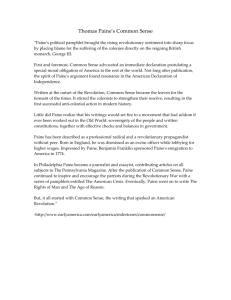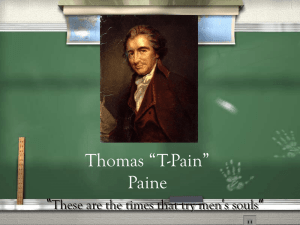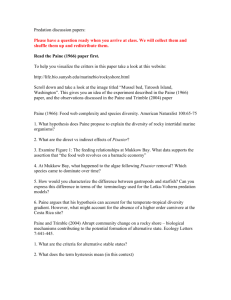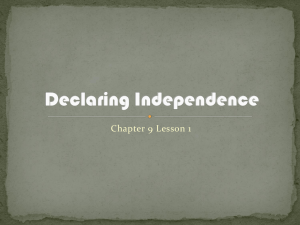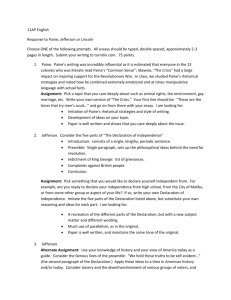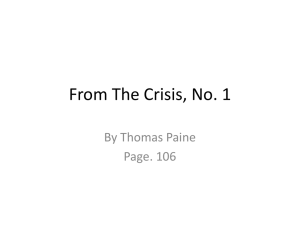The Age of Reason or the Revolutionary Period in American
advertisement
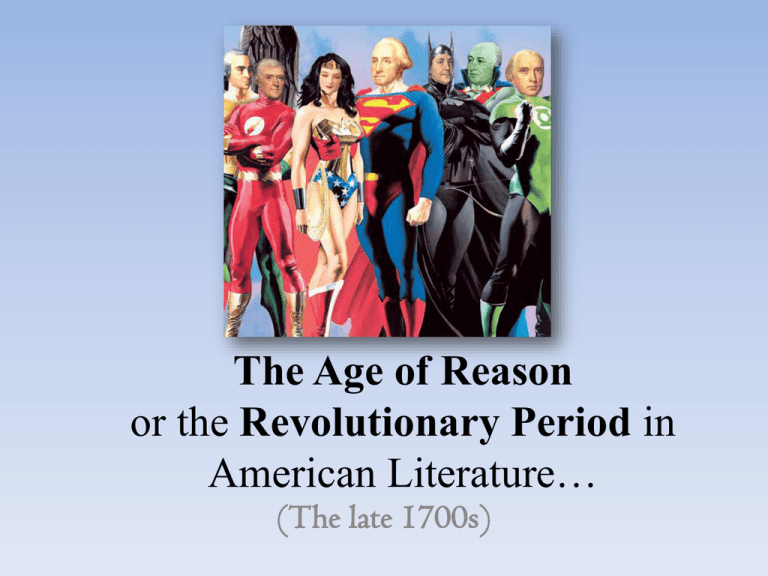
The Age of Reason or the Revolutionary Period in American Literature… (The late 1700s) Puritans vs. the Revolutionary Period • By the end of the 1700s, the Puritan influence on America began to wane • Spurred by the work of many seventeenth-century thinkers—scientists such as Galileo and Newton, philosophers like Voltaire and Rousseau, and political theorist John Locke—the writers and thinkers of the Enlightenment valued reason over faith. • Unlike the Puritans, they had little interest in the hereafter, believing instead in the power of reason and science to further human progress. • They believed that people are by nature good, not evil • In contrast to the private soul-searching of the Puritans of New England, much of what was produced during the Revolutionary period was public writing. Age of Reason vs. Age of Faith Smallpox Outbreak Reason • Borrowed ideas from a Turkish physician • Illogical according to current beliefs/values • Cotton Mather moved to promote inoculation • Moved to make decisions based on rational thought Faith • Interpretation based on “gods providence” • Devout religious beliefs – “Let us look upon sin as the cause of sickness.” – Inoculation would violate, “the all-wise Providence of God Almighty.” God and the Natural World • Rationalists thought it unlikely for God to choose to reveal himself at particular times to particular people. • They believed that God had made it possible for all people at all times to discover natural laws through their God-given faculty of reason. Deism Deists came from different religious backgrounds Examples: Franklin, Jefferson, Thomas Paine Looked to identify principles that united all religions Beliefs: The universe is orderly and good Stressed humanities inherent goodness Perfectibility of every individual through the use of reason Gods objective = happiness of people Provided the basis for the principles of the American Revolution and system of government How do events of a given time influence what is written? To answer this question, you should know that the most important pieces of literature during the AGE OF REASON, were political documents, speeches, and pamphlets (short, concise works that usually argue for or against a political cause.) Non-fiction (such as the forms mentioned above) was far more influential than fiction. Can you name works of Lit. That fit this description? List as many as you can. List of political documents that we think might be a part of the Age Of Reason (Revolutionary Period) The Declaration of Independence (political document) Thomas Paine’s The Crisis (pamphlet) Autobiography of Benjamin Franklin The Age of Reason as a Literary Period Age of Reason: a movement that was marked by an emphasis on rationality rather than tradition, scientific inquiry instead of unquestioning religious dogma, and representative government in place of monarchy. Important writers: Thomas Jefferson, Benjamin Franklin, Thomas Paine, Patrick Henry, and any other of the so-called “Founding Fathers.” Thomas Paine “Those who expect to reap the blessings of freedom must undergo the fatigue of supporting it.” Thomas Paine was a renowned pro-America writer and author of some of the most persuasive texts of the American Revolution He used “plain -style” language in an attempt to engage people of all classes in the struggle for American independence and for a rejection of government based on hereditary monarchy His bold and simple argument rallied a scattered citizenry to the cause of freedom and exerted considerable influence on the new nation’s emerging political philosophy Paine wrote the first of the American Crisis letter pamphlets after witnessing the loss of New York and joining the retreat to Newark…a text that George Washington ordered read to all the troops. Pamphlets helped to bolster the sagging spirits of the ill-fitted troops and firm the resolve of an occasionally diffident population Benjamin Franklin (1706-1790) “A life of leisure and a life of laziness are two things. There will be sleeping enough in the grave. “ Aphorism: A Penny Saved is a Penny earned Franklin wrote the first section of The Autobiography in 1771 at the age of 65. At the urging of friends, he wrote three more sections—the last shortly before his death. Though never completed, his Autobiography, filled with his opinions and suggestions, provides not only a record of his achievements but also an understanding of his character. Considered to be the “father of his country” Age of Reason Re-Cap ►Give three characteristics of the Age of Reason. ►Name 2 authors that represent the Age of Reason. ►Answer the following question: • Why were political documents so important during the Age of Reason? Rhetorical Devices • Figurative Language • Hyperbole • Rhetorical Questions • Parallelism • Connotative Language Figurative Language • Language that is used for descriptive effect • Figurative language expresses meaning beyond the literal level • “The summer soldier and the sunshine patriot will, in this crisis, shrink from the service of his country; but he that stands it now, deserves the love and thanks of the man and woman.” • Thomas Paine uses imagery to point out the difference between colonists who were unwilling to endure hardship and those who were willing to carry on despite bitter winters and military defeats. Hyperbole • A figure of speech that uses exaggeration to express strong emotion, to make a point, or to evoke humor. • “The heart that feels not now is dead…” Thomas Paine uses hyperbole to enhance an emotional appeal when explaining a momentous opportunity the Revolution presented for freedom and human progress. Rhetorical Questions • A question to which no answer is expected • A rhetorical question emphasizes the obvious answer to what is asked • “They tell us, sir, that we are weak; unable to cope with so formidable as adversary. But when shall we be stronger? Will it be next week, or the next year? Will it be when we are totally disarmed, and when British guard shall be stationed in every house?” • Patrick Henry’s speech technique builds to an emotional climax and makes a strong impression on listeners.” Parallelism • The use of series of words, phrases or sentences that have similar grammatical form. • “Our petitions have been slighted; our remonstrances have produced additional violence and insult, our supplications have been disregarded, and we have been spurned, with contempt, from the foot of the throne.” • Patrick Henry’s speech reaches a powerful climax with reference to the English king. Connotative Language • This refers to the suggested or implied meanings that are associated with a word beyond its dictionary definition. • They make an emotional and ethical appeal. • “He has plundered our seas, ravaged our coasts, burned our towns, and destroyed the lives of our people.” • Thomas Jefferson uses verbs with strong negative connotations: plundered, ravaged, destroyed all produce a strong emotional effect.
